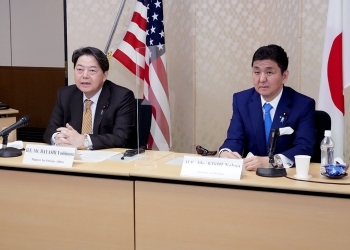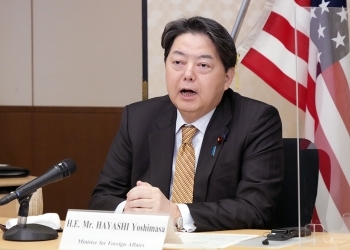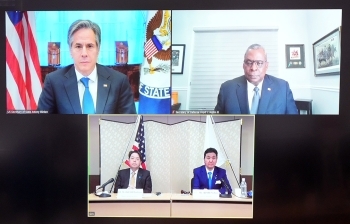Japan-United States of America Relations
Japan-U.S. Security Consultative Committee (Japan-U.S. “2+2”)



On January 7, commencing at 7:30 a.m. for approximately 1 hour and 30 minutes, the Japan-U.S. Security Consultative Committee (SCC) (Japan-U.S. “2+2”) was convened virtually. The meeting was attended by Mr. HAYASHI Yoshimasa, Minister for Foreign Affairs, and Mr. KISHI Nobuo, Minister of Defense, from the Japanese side, and the Honorable Antony Blinken, Secretary of State, and the Honorable Lloyd Austin, Secretary of Defense, from the U.S. side. The overview of the meeting is as follows (a Joint Statement (PDF) was released following the meeting).
was released following the meeting).
1. Overview
- (1) At the beginning of the meeting, the U.S. side stated that while it was unfortunate that the meeting could not take place face-to-face, they were delighted to hold the meeting today as the Japan-U.S. Alliance has never been more crucial, given the various security challenges facing the Alliance, and were strongly committed to further strengthening the robust Alliance to realize a free and open Indo-Pacific. Minister Hayashi stated that it was timely that this year got off to a good start with this Japan-U.S. “2+2” with both secretaries, and that it is more important than ever for Japan and the U.S., sharing strategic interests and universal values, to stand united to exercise leadership not only in ensuring the security of both Japan and the U.S. but also in maintaining the free and open international order based on the rule of law, as well as in securing regional peace, stability, and prosperity. Minister Kishi added that it was extremely meaningful that the governments of Japan and the U.S. held the “2+2” meeting, albeit via video conference, to demonstrate to the world the strong solidarity between Japan and the U.S. and to share the recognition of the future direction of the Alliance.
- (2) Japan and the U.S. affirmed their commitment to a free and open Indo-Pacific region and the Japan-U.S. Alliance’s critical role as the cornerstone of regional peace, security, and prosperity. They concurred to constantly advance the Alliance’s capabilities to address evolving security challenges in an integrated manner.
- (3) Japan reiterated its resolve to fundamentally reinforce its defense capabilities to bolster its national defense and contribute to regional peace and stability. The United States welcomed Japan’s resolve and expressed its determination to optimize its posture and capabilities in the Indo-Pacific.
- (4) The United States restated its unwavering commitment to the defense of Japan under the U.S.-Japan Treaty of Mutual Cooperation and Security, using its full range of capabilities, including nuclear and reaffirmed that Article V of the Treaty applies to the Senkaku islands. The two sides affirmed the critical importance of ensuring that U.S. extended deterrence remains credible and resilient.
2. Regional Security Environment
The four ministers shared their recognition on the evolving regional security environment in detail, and exchanged their views on enhancing collaboration with like-minded partners.
- (1) Japan and the U.S. had in-depth exchange of views on impacts China has on the peace, stability and prosperity of the Indo-Pacific region and the entire world, and concurred to stand in firm solidarity in opposing any unilateral action that seeks to change the status quo or to undermine Japan’s administration of the Senkaku Islands and on their strong objections to China’s unlawful maritime claims, militarization and coercive activities in the South China Sea. Both sides also consented to work together to deter and, if necessary, respond to destabilizing activities in the region.
- (2) Japan and the U.S. also expressed serious and ongoing concerns about human rights issues in the Xinjiang Uyghur Autonomous Region and Hong Kong.
- (3) Furthermore, regarding Taiwan, Japan and the U.S. underscored the importance of peace and stability in the Taiwan Strait and encouraged the peaceful resolution of cross-Strait issues.
- (4) As for North Korea, Japan and the U.S. reaffirmed their commitment to the complete denuclearization of North Korea, and expressed strong concerns over its advancing nuclear and missile development activities, including its ballistic missile launch on January 5th. Minister Hayashi called for understanding and cooperation for the immediate resolution of the abductions issue, to which the U.S. expressed its support.
- (5) With regard to cooperation with like-minded countries, Japan and the U.S. reaffirmed the September 2021 commitment with fellow Quad members, to promote the free, open, rules-based order and concurred on the importance of strengthening collaboration and cooperation with partners such as Australia, European countries, the Republic of Korea, and ASEAN.
- (6) In addition, Japan and the U.S. exchanged their views on issues of common interests including the situation around Ukraine, and reiterated their consistent support for Ukraine’s sovereignty and territorial integrity.
3. Strengthening Bilateral Security and Defense Cooperation
The four ministers had concrete discussions toward fundamentally enhancing the Alliance’s deterrence and response capabilities, to effectively address challenges the both countries face today. Furthermore, they concurred on the importance of vigorously continuing their efforts to ensure the Alliance maintains its competitive edge into the future, such as further enhancing information security, deepening cooperation in space and cyber domains, and advancing technological cooperation to harness emerging technologies and of pursuing investments to strengthen the Alliance’s capabilities looking ahead to the future.
- (1) Minister Kishi explained that the Government of Japan will formulate its new National Security Strategy, National Defense Program Guidelines, and Medium-Term Defense Program in order to expeditiously and fundamentally reinforce its national defense, examining all options including capabilities to counter missile threats. The U.S. side welcomed Japan’s resolve, and Japan and the U.S. confirmed to continue their close collaboration to align both countries’ strategies and policies.
- (2) The Japanese side stated that, through discussions regarding the Alliance’s roles, missions and capabilities, they will maximize the capabilities of Japan and the U.S. Japan and the U.S. welcomed their robust progress on evolving Alliance roles, missions, and capabilities, and on bilateral planning for contingencies.
- (3) Japan and the U.S. underscored the critical importance of strengthened cross-domain capabilities. Minister Hayashi referred to the importance of enhancing bilateral coordination on diplomatic efforts, strengthening of the Alliance’s response capability, and capacity-building of third countries, in light of increasing threats in cyberspace. Minister Kishi stated that Japan will steadily build up JSDF capabilities in the cyber domain, and intends to further deepen collaboration with the U.S. As for cooperation in the space domain, Minister Hayashi emphasized the importance of collaboration with regard to “responsible behavior” in outer space and of deepening discussions on Allied response to serious situations in outer space. Minister Kishi underscored the importance of cooperation between JSDF and the U.S. in outer space. Based on these discussions, Japan and the U.S. confirmed to deepen security cooperation in both space and cyber domains.
- (4) Japan and the U.S. affirmed the two sides will advance and accelerate collaboration on emerging technologies based on the framework Exchange of Notes on Cooperative Research, Development, Production and Sustainment as well as Cooperation in Testing and Evaluation. Minister Hayashi also referred to strengthening economic security, and both countries confirmed to closely collaborate with each other.
4. Force Posture and U.S. Forces in Japan
The four ministers shared the importance of steadily implementing the realignment of U.S. forces in Japan, from the perspective of mitigating the impact on local communities including Okinawa, while maintaining the deterrence of the Japan U.S. Alliance.
- (1) Japan and the U.S. committed to continuing construction of the Futenma Replacement Facility at the Camp Schwab/Henokosaki area and in adjacent waters as the only solution that avoids the continued use of Marine Corps Air Station Futenma.
- (2) Minister Kishi explained the Government of Japan’s decision to develop the Mageshima facility and to fund its construction, which will commence following completion of the ongoing environmental impact assessment (EIA), in its JFY 2022 draft budget, and expressed that Japan will make efforts toward early completion. The U.S. side welcomed Japan’s efforts. Japan and the U.S. confirmed the importance of accelerating bilateral work on force realignment efforts, including land returns South of Kadena based on “Consolidation Plan for Facilities and Areas in Okinawa”, and the relocation of approximately 4,000 Marine Corps personnel from Okinawa to Guam beginning in 2024.
- (3) Minister Hayashi and Minister Kishi requested the U.S. side for safe operations of the U.S. forces with utmost consideration to the impacts on local communities, appropriate responses to incidents and accidents including sharing information in a timely manner, and cooperation on issues such as PFOS, and both sides confirmed to continue to closely cooperate. In light of the recent COVID-19 infection situation among the personnel of U.S. Forces in Japan (USFJ), Minister Hayashi and Minister Kishi strongly urged the U.S. side to strengthen and enforce measures to prevent the spread of COVID-19, including putting in place restrictions on off-base activities in order to alleviate local anxieties including USFJ local employees. Secretary Blinken responded that he clearly understood Japan’s request and would make efforts to alleviate Japan’s concerns together with the Department of Defense and the Joint Chiefs of Staff. Secretary Austin responded that he was already informed of the exchanges between Secretary of Blinken and Minister Hayashi held on the previous day, and that he will continue to attach importance on the safety of local residents and U.S. Forces’ personnel, keep consultations with the military leadership, and make efforts to the extent possible to keep troops and local residents safe since the safety of local residents and U.S. troops is of utmost importance.
- (4) Japan and the U.S. welcomed the consensus on a new Host Nation Support arrangement and the signing of the Special Measures Agreement that will enhance Alliance readiness and resiliency.

